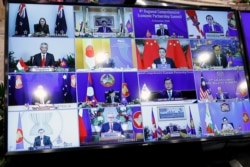China and leaders from 10 Southeast Asian countries who held annual summits this month sidestepped a sticky maritime sovereignty question to focus on trade and COVID-19, signaling a tough year ahead for the rival nations, experts believe.
Apart from polite acknowledgements of the dispute, which engulfs about 90% of the South China Sea including prime fisheries and energy-exploration tracts, Beijing and the Association of Southeast Asian Nations (ASEAN) barely touched on the issue at the 37th ASEAN Summit November 12-15.
More robust discussions focused on China’s international COVID-19 response and a long-awaited signing of the Regional Comprehensive Economic Partnership trade deal. Those topics elevated everyone’s mood, analysts say, while no one had any new proposals for easing the maritime spat despite a volatile past year dominated by U.S. pushback over Chinese activity in the sea.
“Amidst this celebratory mood, I don’t think they would dampen that with something very harsh on the South China Sea,” said Oh Ei Sun, senior fellow with the Singapore Institute of International Affairs.
ASEAN members Brunei, Malaysia, the Philippines and summit host Vietnam vie with the militarily stronger China in the sovereignty dispute.
Over the past decade of South China Sea incidents, China has angered Vietnam with an oil rig and survey ships, startled Malaysia with coast guard passages and inflamed the Philippines by taking over a disputed fishing-rich shoal. China alarmed all the claimants by using landfill to build and occupy disputed islets in the sea. Officials in Beijing cite historical usage records to back their claims.
Summit Host Vietnamese Prime Minister Nguyen Xuan Phuc noted the issue in passing during an ASEAN-China Summit, one in a series of breakout meetings.
“Discussing the international and regional situation, the leaders of both sides shared the view on the importance of building the East Sea into a sea of peace, security, stability, and cooperation,” the prime minister said in a statement, using Vietnam’s term for the contested waterway.
Vietnam is usually the most outspoken ASEAN member on the issue and might feel pressure to comment -- though not too boldly -- said Alexander Vuving, professor at the Daniel K. Inouye Asia-Pacific Center for Security Studies in Hawaii.
“If they feel a lot of peer pressure [that] they have to sign, then the text will be very watered down to something that’s very vague and based on what we have already seen,” he said, referring to statements from previous summits.
The Vietnamese prime minister said more in the statement on COVID-19, particularly China’s $1 million commitment for an ASEAN pandemic response fund. Both Vietnam and China report low caseloads and normal economic activity, but tourism, events and factory orders are still struggling because of disease-related shutdowns in the West.
The new trade partnership would help the economies of its 15 members by forming the world’s largest trading network, one that covers about a third of all global economic activity. China and ASEAN, a bloc covering about 650 million people, both signed.
The partnership signing Sunday without action on the maritime dispute sends a message from ASEAN to China that trade takes priority over maritime security, said Stephen Nagy, senior associate professor of politics and international studies at International Christian University in Tokyo.
This year’s South China Sea impasse adds pressure on everyone to sign a maritime code of conduct by next year, heeding a timeline proposed in 2018 by Chinese Premier Li Keqiang, analysts say.
China and ASEAN have been working on the code, aimed at preventing mishaps at sea, since 2002. China had stalled for years but renewed interest in 2016 after losing a world court arbitration case to the Philippines.
ASEAN and China still disagree on which tracts of the 3.5 million-square-kilometer sea the code should cover and on who would enforce the code. If China and the ASEAN bloc sign a code, each party might apply it differently because of the split over enforcement, Vuving said.
“I think that the COVID crisis is probably going to make it difficult for them to prioritize a code of conduct when they’re more concerned about recovering their domestic economies and resuming trade and tourism and everything else,” Nagy said.
Southeast Asian countries are shelving the maritime dispute as well this year to wait for U.S. President-elect Joe Biden to make his views clear, Oh said.
President Donald Trump increased the frequency of U.S. Navy ships sent to waters near China and stepped up arms sales to surrounding countries as warnings to Beijing. ASEAN members felt protected by Washington but worried too about a possible conflict between the two superpowers, scholars in the region have said.





